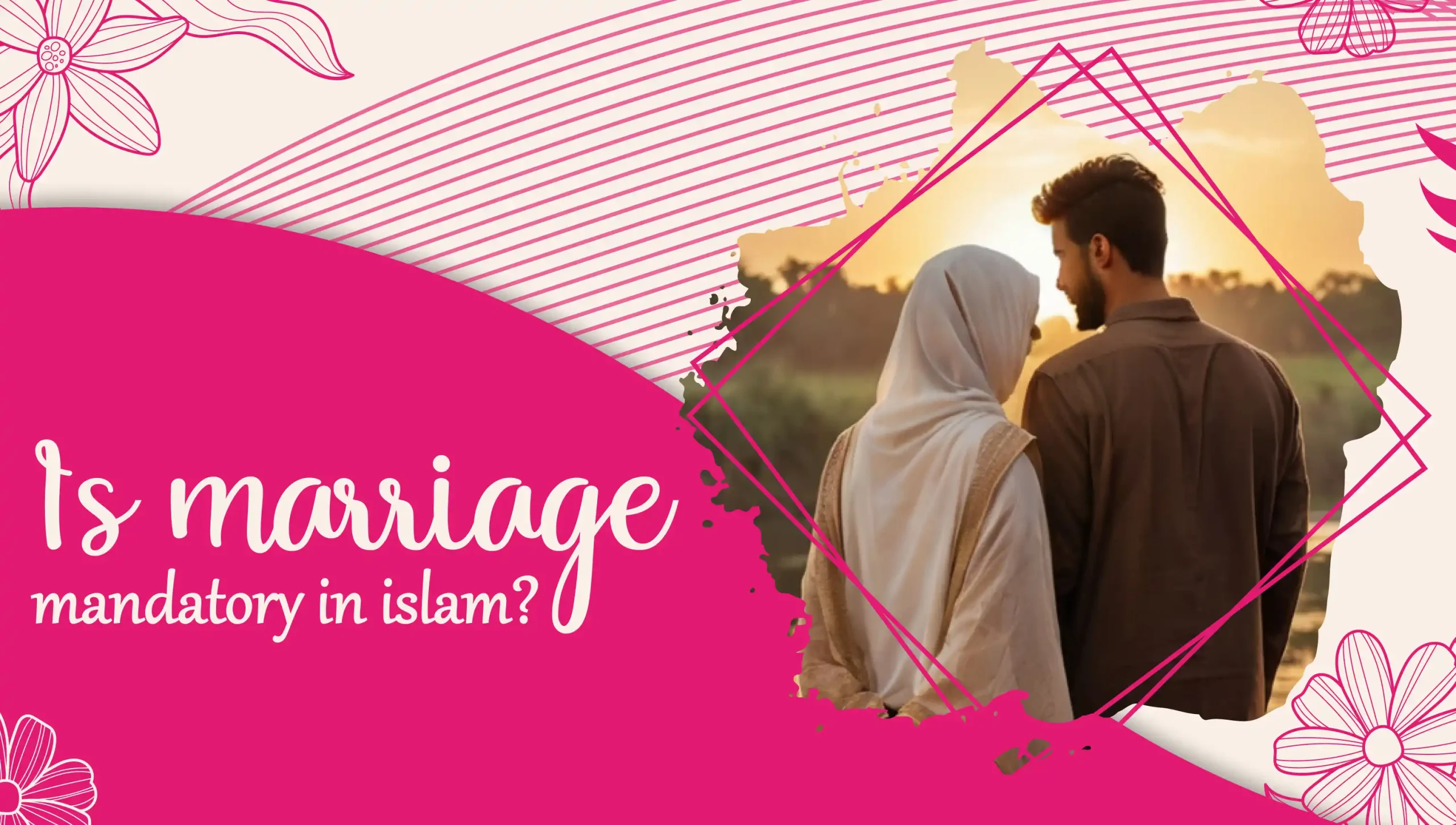Marriage plays a central role in Islamic life, guiding not only the personal but also the social and spiritual aspects of a Muslim’s existence. While marriage is highly encouraged in Islam, the question arises: Is marriage mandatory in Islam? This article will explore whether marriage is obligatory in Islam, focusing on various facets of the institution, its necessity, and the Islamic perspective on living without marriage. It will also address what the Quran says about weddings, marriage’s classification, and whether it is compulsory for men or women.
Is Marriage Compulsory in Islam?
In Islam, marriage is a significant institution, but it is not universally compulsory. The concept of marriage in Islam is flexible, with its obligations depending on the individual’s circumstances. Is marriage mandatory in Islam? The answer is nuanced.
Islam recognizes various levels of obligation for marriage:
- Farz (Obligatory): Marriage becomes obligatory for someone who fears committing sinful acts like zina (fornication) and is financially capable of supporting a spouse. Such a person is obligated to marry, as avoiding marriage could lead to immoral behavior.
- Sunnah (Recommended): For those who do not fear sin and are capable of getting married, marriage is highly recommended. This is the category that many fall under, as marriage is seen as the way to promote chastity and fulfill natural desires lawfully.
- Mustahabb (encouraged but not mandatory): Some scholars suggest that marriage is encouraged for those who can afford it, but it is not compulsory.
- Makruh (Disliked): Marriage may be discouraged in specific circumstances, such as when an individual is unable to fulfill marital responsibilities or is not emotionally prepared for the commitment.
Thus, while marriage is highly recommended and often seen as mandatory in specific situations, it is not universally required.
The Significance of a Wedding in Islam
A wedding in Islam is an important occasion that marks the beginning of a lawful relationship. However, is it obligatory to have a wedding in Islam in the sense of a large public ceremony? The answer is no. Islam does not mandate that a couple must have an extravagant wedding or celebration. What is obligatory is the legal contract, known as the Nikah, which ensures the union is recognized in Islam.
Can We Live Without Marriage in Islam?
Is It Okay to Not Get Married in Islam? It is important to understand that living without marriage in Islam is not prohibited as long as it does not lead to immoral actions. For those who can maintain chastity and control over their desires, it is permissible to live a single life.
However, Islam generally promotes marriage as a means of fulfilling natural desires in a lawful manner and avoiding sin. The Quran and Hadith emphasize marriage as a way to protect oneself from immoral behavior and maintain a stable society. Is it okay to not get married in Islam? Yes, it is, but Islam places greater emphasis on the virtues of marriage.
What Does the Quran Say About Weddings?
The Quran speaks highly of the institution of marriage. It emphasizes the tranquility, affection, and mercy between spouses, which are considered key components of a successful marriage. The Quran refers to the relationship between a husband and wife as one built on love and compassion.
“And among His signs is that He created for you from yourselves mates that you may find tranquility in them; and He placed between you affection and mercy.”
— Surah Ar-Rum (30:21)
This verse highlights the importance of emotional and spiritual fulfillment through marriage, which is designed to bring peace and stability to the lives of individuals.
Why Is Marriage Necessary in Islam?
Marriage serves multiple purposes in Islam. It is not just a social contract; it also has significant spiritual, emotional, and practical implications.
Protection from Sin
Marriage is seen as a means of protecting individuals from falling into sinful acts, particularly zina (fornication). By marrying, individuals are able to satisfy their natural desires in a lawful and socially acceptable manner.
Fulfillment of Natural Desires
Islam recognizes that human beings have natural desires, including sexual desires. Marriage is the means by which these desires are fulfilled lawfully, in accordance with Allah’s teachings.
Spiritual and Social Fulfillment
Marriage is a way for individuals to grow spiritually and emotionally. In a strong and supportive marriage, both partners fulfill their emotional and physical needs, contributing to overall well-being and contentment. Additionally, a stable marriage fosters societal stability by building strong family units.
Is Marriage Farz or Sunnah?
The classification of marriage as farz (obligatory) or sunnah (recommended) depends on the individual’s circumstances. Let’s explore the two classifications:
Is Marriage Farz in Islam?
Marriage becomes farz (obligatory) if a person is afraid of falling into sin and has the means to marry. If someone is at risk of committing immoral acts due to their desires and can afford to support a spouse, marriage is considered obligatory. Is marriage mandatory in Islam for such individuals? Yes, it is farz, as it serves to protect them from harm and sin.
Is Marriage Sunnah in Islam?
For those who do not fear sinning and have the ability to marry, it is considered sunnah (recommended). Marriage in this context is not obligatory but highly encouraged. The Prophet Muhammad (PBUH) emphasized the importance of marriage, and it is viewed as a way to protect one’s faith and live a fulfilling life.
Is It Haram to Get Married Outside Islam?
Islam has specific guidelines regarding marriage between Muslims and non-Muslims. While it is not haram for Muslim men to marry women from the People of the Book (Jews and Christians) outside Islam, there are specific conditions that must be met. However, it is generally haram for a Muslim woman to marry a non-Muslim man. The main concern is that the faith of the Muslim woman could be compromised, as Islam places great importance on maintaining the faith within marriage.
Is It Compulsory for a Woman to Marry in Islam?
The question of whether marriage is compulsory for women in Islam has often been debated. While marriage is encouraged, it is not compulsory for all women. A woman is only obligated to marry if she cannot support herself and fears committing immoral acts. In such cases, it becomes obligatory for her to accept a marriage proposal from a suitable partner. However, if she is independent and able to maintain chastity, marriage is not mandatory.
What Are the Conditions of Marriage in Islam?
Marriage in Islam is based on certain principles and conditions that must be followed for the union to be valid. These include:
- Mutual Consent: Both the man and woman must consent to the marriage. Forced marriages are not permissible in Islam.
- Witnesses: Two witnesses, who are Muslim, must be present during the marriage contract.
- Mahr (Dowry): The groom must give a mahr (dowry) to the bride as a sign of respect and commitment.
- Wali (Guardian): A woman must have the consent of a guardian (usually her father) unless she is an independent adult.
Is Marriage Compulsory in Islam for Men?
For men, marriage is compulsory in Islam if they fear falling into sin and have the ability to marry. If a man has the means and the desire to marry, but chooses not to, it could be considered sinful, as it may lead to immoral behavior. Thus, for those who are financially and emotionally capable, marriage is an obligation.
Conclusion
So, is marriage mandatory in Islam? The answer depends on individual circumstances. Marriage is compulsory for those who fear sinning and can afford to support a spouse. For others, it is recommended and viewed as a virtuous act, but it is not an obligation. Islam provides clear guidance on when marriage becomes necessary and when it is encouraged. Marriage serves not only as a means of fulfilling natural desires but also as a way to protect one’s faith, foster emotional fulfillment, and contribute to societal stability.


 Address: House: 8/A, Road 14, Dhanmondi, Dhaka-1209
Address: House: 8/A, Road 14, Dhanmondi, Dhaka-1209 Email:
Email: